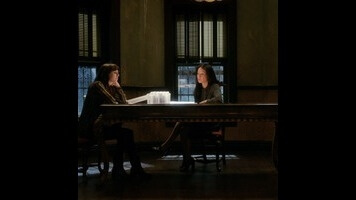An ambitious Elementary two-parter gets in over its head

Mz. Jabez Wilson laughed heavily. “Well I never!” said he. “I thought at first that you had done something clever, but I see that there was nothing in it after all.”
– Sir Arthur Conan Doyle, “The Red-Headed League”
By now, with Elementary at the two-thirds mark of its fifth season, it’s clear the show walks a knife edge between comfort and complacency. It’s still capable of small moments of deep feeling; Sherlock and Kitty’s abrupt, vaguely hostile non-apologies to each other about their lapsed relationship is a perfect microcosm of what drew them together and why it’s so difficult for either of them to accept normalcy. But there are also things the show used to handle more carefully, and continuing to involve them without that care only leads to disappointment; when erosion of good faith takes a toll on a show, even the successes feel harder-won and more tenuous than they used to.
Take the adaptation of canon stories. Elementary has a spotty track record with direct adaptations; it’s much better at folding individual elements into a modern narrative. (I see the “Fidelity” pun here and refuse to make it.) And honestly, in some ways, “Fidelity” marks a fitting adaptation of “The Red-Headed League,” if for no other reason than because most of the character-rich setup of the first half turned out to be a distraction so that the show could use schizophrenia as a plot point, try to squeeze another pound of plot into an already-busy episode, and play around with some background international chaos.
The first two are Elementary in failure mode—that is, a standard CBS procedural—and fall flat for the obvious reasons. But this show has done very well in the past by throwing Joan and Sherlock into cases that go above their pay grades, allowing them to do only so much before they’re forced to put their trust in the same institutions that were trying to stymie their investigations. It’s grounding to have an adaptation that occasionally renders them powerless for good reason. That awareness that there’s a more complex justice system is something Elementary has worked hard to build; there’s a reason Sherlock both keeps calling on Agent McNally and has yet to take him at his word.
Someone viciously sowing false news under the auspices of patriotism is painfully timely stuff. (“An American covert agent is staging Iran’s nuclear weapons program in his mom’s basement in order to start a war” is the kind of thing you build a season of Homeland around.) With his abuse of government power, blithely extrajudicial actions, and carefully staged political theater, Gephardt is as formidable an opponent as Sherlock’s faced in a while. But to have fake news with such obvious real-world parallels shunted to the sidelines is at best dismissive; if you’re going to have such a portentous and pointed setup, shouldn’t you be willing to spend more than four minutes on it? Or is it merely another Venezuelan toilet bomb, designed to suggest those giant stakes and parallel real-world problems—and it’s definitely meant to; nobody watching suspected that the ‘true thing’ was going to end up being Chinese astronauts—but really just giving our trio something to exposit about until the real problem shows up? When the highlight of the scene in which Sherlock delivers world-saving information to the right hands is that he disdains leftovers, something’s unbalanced between content and tone.
But honestly, by now there are things that make me feel foolish for pinning hopes to the show. At the end of the first part, I was excited about Joan and Kitty working together in Sherlock’s absence; that was, clearly, optimistic. Not that I dislike Sherlock working with the team; I loved the old-married frustration of Joan trying to casually saw off zip ties while doing a quick catch-up before Sherlock’s bladder explodes. (The joy of “Could you just gnaw it off?”) But there only seems to be room for one emotional beat amid the case, and since it’s Kitty and Sherlock’s turn, Kitty and Joan lose out. Joan, though she appears in several scenes, is so absent from the actual narrative that Kitty, otherwise a vibrant presence in the episode, gets her characterization flattened merely from proximity to Joan. (Somehow, the two of them managed to go all night in a safe-house hotel room without ever bringing up the thing that was most troubling Kitty and has now been thrown into sharp relief by his absence?) And that’s doubly strange in an episode where family was the underlying theme—and where Joan being part of it was supposedly explicit. Given that Joan and Kitty were squaring off last episode and the only thing that changed in the meantime was a brief scene with Archie, I’d love to know how we got here from there.
That said, Kitty and Sherlock’s confrontation carries a lot of weight and provides more closure than I ever expected them to have. And it’s a perfect way for their similarities to make them both miserable; they’re both terrified to be vulnerable, and her fear of losing his approval is horrifically matched with his resentment at her lost friendship. Sherlock gives reasons he doesn’t buy, Kitty gives reasons she doesn’t buy, they mutually bristle, and they have to take a break and cool off before either of them can be emotionally honest.
This arc is a reminder of the emotional work this show can still do. We see how Sherlock and Kitty had already gone as far as they could as master and apprentice (a horizon that isn’t applicable to Sherlock and Joan, no matter what Sherlock may grumble about proteges), but also the connection that still exists underneath their interlocking insecurities. A little family christening might feel too neat—particularly at the end of a case whose solution feels so unexamined —but sometimes, you take what you can get.







































